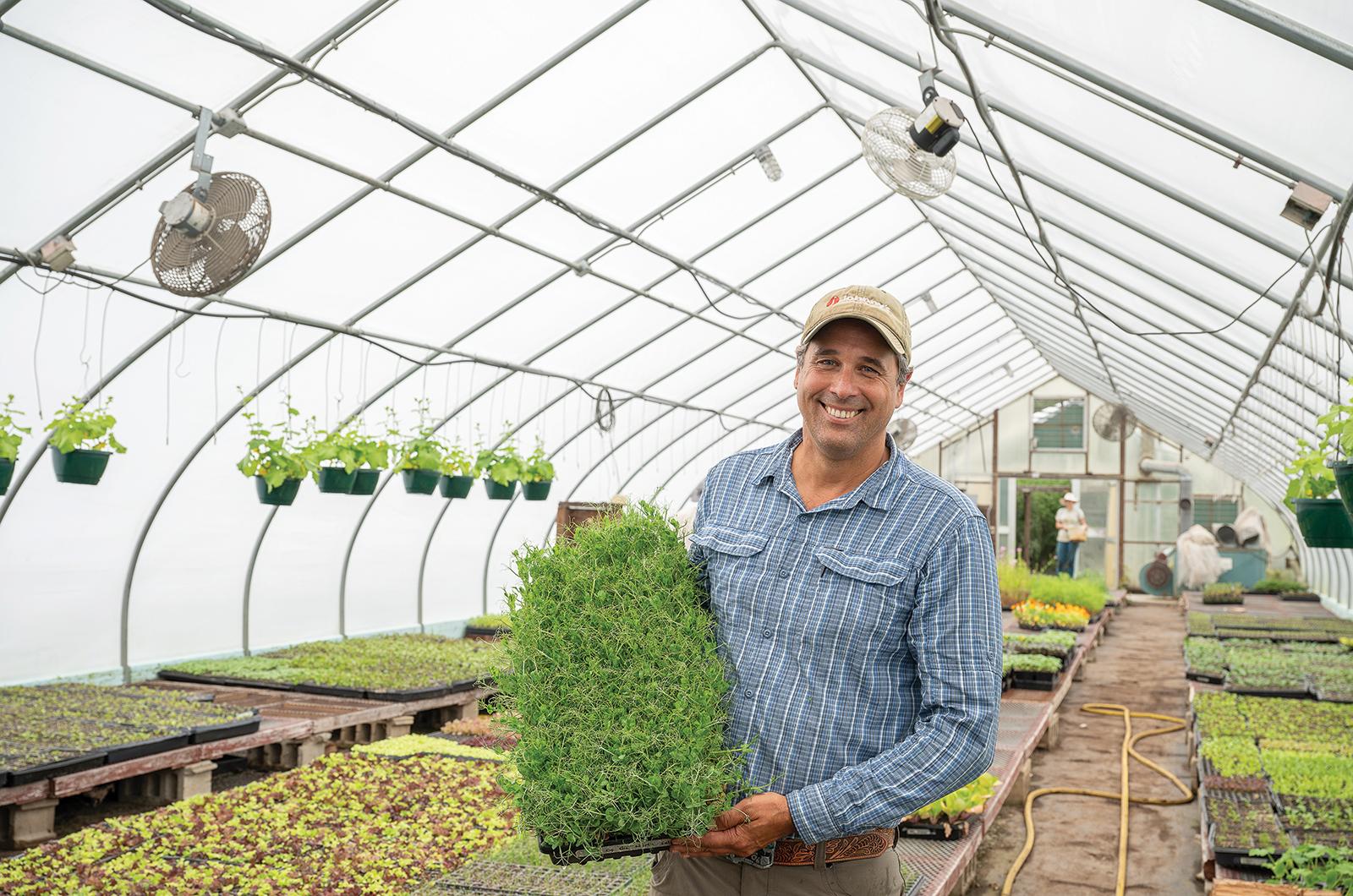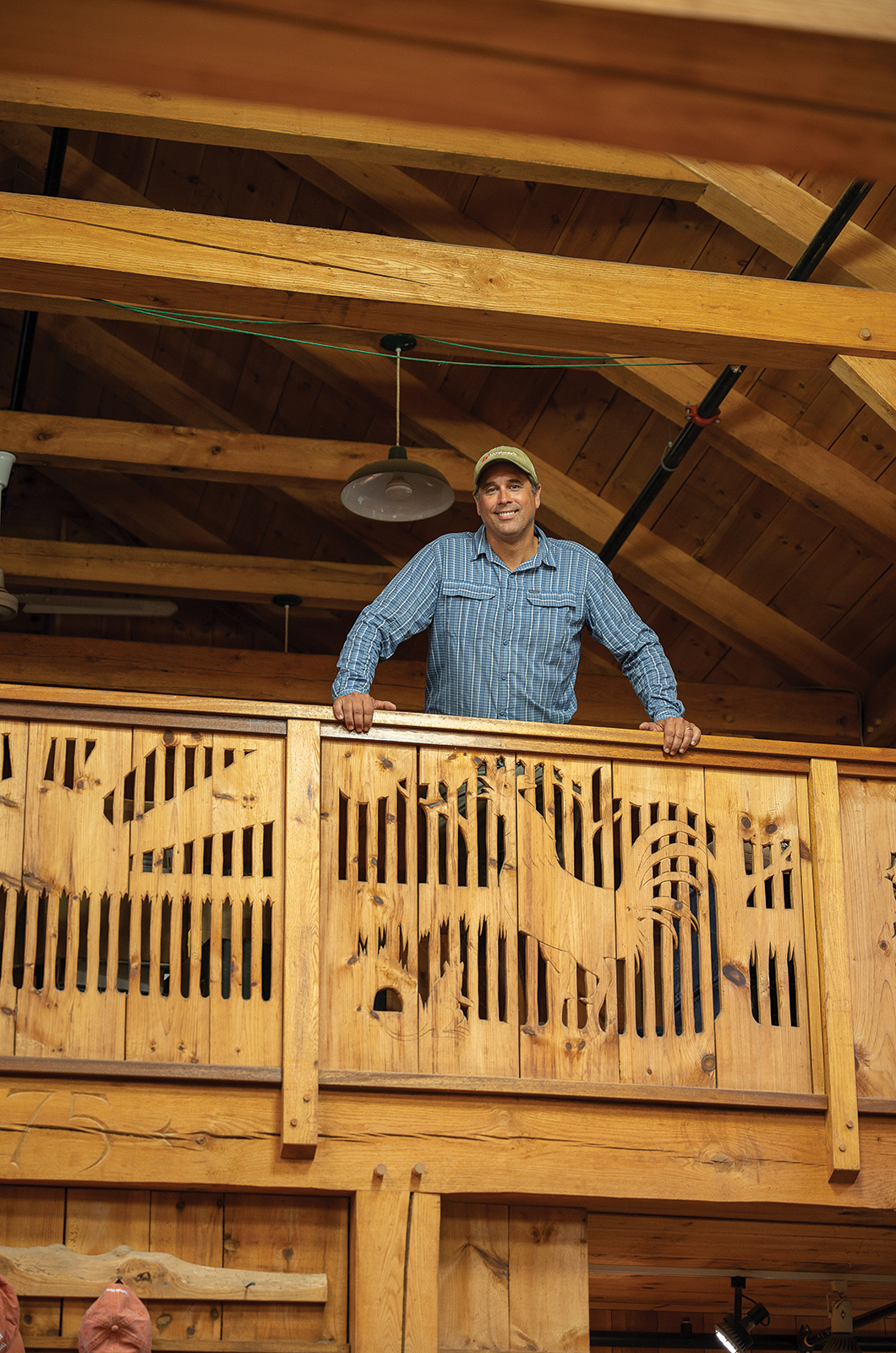Morning Glory Farm has been an agricultural fixture on Martha’s Vineyard since 1975. While founders Jim and Debbie Athearn have officially handed over ownership to their children, they remain actively involved in daily operations. Leading the next generation is their eldest son, Simon, who plays a crucial role in maintaining the farm’s legacy and driving its growth as chief executive officer. (Simon’s brother and sister-in-law Daniel and Meaghan Athearn are also farm owners, as is Simon’s wife Robyn Athearn). When the summer is over and the farm’s picturesque scenes of coffee cans bursting with sunflowers or piles of freshly picked corn are left to Instagram stories, the farm’s dedication and commitment to the local community continues throughout the fall, winter and spring, keeping the Island in fresh vegetables, delicious prepared foods and artisanal breads.
Q. Share an early memory of your childhood on the farm.
A. I’m lucky to have so many good ones, but a really early one that comes immediately to mind is just the pride my parents had when they took us to the pumpkin field so their kids could pick the finest pumpkin in the patch. It was a pretty good thing for a little kid. We’d pick a nice, perfect big one, and for a number of years we had the tradition of putting our beagle in the pumpkin and taking his picture with his head popping out.
Q. Did you eat vegetables as a kid?
A. I wasn’t one of those kids who was afraid of vegetables. None of us were. My mother was a steadfast home cook: reliable, on time, two veggies, a starch and a protein on the plate with tall glasses of warm milk from the cows milked just before dinner. They were just so proud of how many ingredients they could get on the table that were Island-sourced. And that’s how we load our front table at the store entrance today – to show shoppers what’s popping, the best things coming out of the fields right now. That’s the siren song of the farm.
Q. Growing up on the farm, were you as interested in learning about soil as you were in driving one of the tractors – many of which we see at the edge of the farm?
A. Absolutely right! Being able to drive the farm trucks and use the tractors, or cruising around on a dirt bike, was very entertaining. But even at eight or nine years old, I knew how special it was to grab a friend and go out to the fields for the first peas, to pick strawberries or to make rhubarb drinks over a campfire. As I got older, I really understood the science of soil balancing and the cover crops which my parents were obsessed with.
Q. What is the importance of cover crops?
A. A cover crop protects the soil from the sun and erosion. When you’re not growing your cash crop you want something else living in its place – food for the soil. Soil hates to be naked; it wants to be covered. In our standard mix, we do Austrian field peas, daikon, hairy vetch and winter rye. Even when our fields look like they’ve been put to bed for the winter, there are four or five species of crops out there all doing specific things.
Q. Was it always understood or expected that you and your siblings would be the next generation to run the farm?
A. My parents said to all three of us – kind of quietly but over and over – that this was their dream, their business, and that we could go ahead and chase whatever we wanted. So I thought a lot about what I might do if I didn’t come back to the farm. In high school I moved out of the fields and into the bakery here and worked in restaurants on the Island at night, which I really liked. I decided to go to pastry school in New Hampshire to study pastry and chocolate and eventually went to business school in Montana.
Q. How did your business degree apply to being a farmer?
A. I really liked having something practical – the farm – to think about while I was doing my thesis and those business school projects. In 2000, I came back to the farm and had a great summer working with my brother and sister, and it all became really clear. The next year I came back permanently.
Q. Where have you had the most impact in the transition of ownership?
A. The vegetable production line, the washdown and the refrigeration used to be all done here in the back of the building. When the government changed their laws and inspection approvals, I was able to snag a big grant which paid for the majority of building the new vegetable barn, which has a sloping concrete floor, insulated walls, walk-in coolers, huge (30 gallon) salad spinners and a root crop barrel washer. What this meant is that we could grow and store a lot of the crops we lean on – carrots, beets, parsnips, turnips, cabbages and kohlrabi – opening up a new, bigger chapter so we can be open in the winter with the goal of filling that off-season gap.
Q. On behalf of my fellow full-time residents, thank you for being open year-round!
A. We deemed that moving to a year-round model was healthier for the staff and better for the business. What really supports us is offering prepared foods, cooking oils, cheese and all the things people need so that they don’t have to stop in two places to get dinner. Another big part of the year-round operation is being able to buy supplemental produce from other farms in Massachusetts and Vermont. So when our green beans run out, we have a van off-Island that we share with other farms so we can offer our customers continuity.
Q. Another really amazing aspect of your year-round production are the eye-popping varieties of tulips which suddenly appear in February next to the warm cider and the wood-burning stove!
A. That is all my wife, Robyn. Forcing tulips is a technical, exacting system of controlling temperature and moisture. They are being grown in West Tisbury in hoop houses. This spring, Robyn went over to Holland to study, and she made bulb connections. We found that there is a demand for flowers in the spring – when we’re hungry for color – and if you deliver that, it just makes people happy.
Q. Another early season crop I look forward to are the late spring hothouse tomatoes.
A. The hothouse [or high tunnel] is an expensive footprint, but when we get a good crop from the high tunnels, we can get 8,000 pounds of ripe tomatoes per tunnel. We have four generations of tomatoes on the farm from the May to the October crop, all grown in the ground.
Q. In a blind tasting, would you know the difference between a hothouse and a field tomato?
A. Yes, mainly due to the water content. I prefer the field tomato at its peak, but honestly any tomato that’s hitting that beautiful moment in any of those growing systems is spectacular.
Q. What’s exciting in seed breeding?
A. New organic seeds in the last two years. We rely on High Mowing [Organic Seeds] and Johnny’s [Selected] Seeds, and things are really improving all the time. There’s a kale variety that looks very promising and the hybrid beets we’re getting – they’re just perfect! I’m also playing with salad greens.
Q. What’s new in your bread production?
A. Our bread oven! We bought a high-quality bread oven after ours broke last summer. This oven has more production capacity, and it has made our talented bakers so happy. They’re having a renaissance moment now that they’ve been given the tools to be great. I like the herb sourdough and the Anadama with the hint of molasses, which my mom used to make. The nose knows.
Q. Morning Glory has always been so generous to the many Island non-profits, providing flowers, zucchini bread or vegetables when asked.
A. We supply what we have. That is my parents’ philosophy which still rings in my ear: If we all give what we have, the world has enough. We grow a lot of food here, and it’s easy to share in-kind donations to support causes we believe in. My sister-in-law Meg coordinates all the donations and it takes a lot of communication.
Q. Describe an ideal August day for the Athearn family.
A. We have three kids, and usually on a Saturday morning we go to the farmers’ market to make sure the booth is set up well and to see if we can pull Robyn out of the flower booth. We live on Tisbury Great Pond and we have a little boat there to take us out to Quansoo or to hikes around Long Point. On a Sunday after a beach day or a hike we go see Grandpa at the bandstand in Oak Bluffs where he plays tuba in the Vineyard Haven Band. That’s just the finest day.
______
Sissy Biggers is a regular contributor to the Vine and a frequent contributor to Martha’s Vineyard Magazine.












Comments